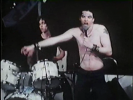Reviews
Allan Moyle
USA, 1980
Credits
Review by Victoria Large
Posted on 04 September 2011
Source 35mm print
Categories American Punk
The Harvard Film Archive’s “American Punk” series kicked off with a well-attended Friday night screening of director Allan Moyle’s Times Square, a cult film whose story was purportedly inspired by the diary of teenage runaway—a diary that Moyle found inside of a second hand couch. A couple of appropriate clips preceded the feature, including one of the legendary cable access program New Wave Theatre and its host, Harvard alum and innovative composer Peter Ivers. Seeing Ivers onscreen helped me bridge the gap between the surrounding Ivy League environment and the seedy punk movies on the evening’s schedule, but it’s worth noting that Times Square is already a film of contradictions.
Moyle’s inspiration may have been gritty, but his producers, including Saturday Night Fever and Grease alum Robert Stigwood, are widely reported to have interfered with the film’s content and soundtrack, and Moyle ultimately left the picture before shooting was completed. The final product is compromised and occasionally disjointed. An opening scene in which one of the film’s young protagonists plugs in her guitar and starts to play, but the noise is nearly drowned out by a slicker tune on the movie’s soundtrack, seems an apt metaphor for what’s going on for much of the movie: with its punk spirit and mainstream trappings, Times Square is often at odds with itself.
But the film is more than a nifty historical document or a chronicle of punk fashions and the mean streets of New York City back in the day. My primary feeling watching the HFA’s print - one from the film’s original theatrical release, which crackled and popped and had gone a bit pink with age - was one of happy discovery. Times Square is imperfect, but there’s definitely something to it.
The film stars Trini Alvarado as Pamela Pearl, the well-behaved but inwardly hurting adolescent daughter of a smug young politician who is spearheading a campaign to clean up Times Square. Robin Johnson plays Nicky Marotta, a punk teenage runaway who ends up sharing a hospital room with Pamela while they both undergo psychiatric testing and treatment. The girls bond and Nicky busts them out, charging down the hospital halls blaring The Ramones from her boombox before she and Pamela steal an ambulance and ride off like a teen Thelma and Louise. The finished film is cagey about the nature of Pamela and Nicky’s relationship, yet while the producers’ reported censoring of the film’s more homoerotic moments certainly smacks of cowardice and generates a degree of narrative confusion, Times Square still succeeds in depicting love, friendship, and, yes, punk rock, as liberating agents.
There are moments of moving authenticity in the young actresses’ performances, such as when Pamela stands quivering in her window listening to a radio DJ dispense advice, looking sad and lonely and very, very young. Or there’s the bit where Nicky sits, in smeared bank robber makeup, tearfully trying to compose a song on the spot and coming up with, in part, “Find me/Help me/Save me.” Alvarado (who later starred in the Peter Jackson cult item The Frighteners) manages Pamela’s transformation from wallflower to rebel convincingly, and Marotta, with her throaty voice and David Johansen pout, gives the story much of its spark.
Still, there are many other moments in Times Square that feel like pure fantasy. Pamela and Nicky’s life in a messy but habitable abandoned building, wearing cute handmade clothes, is awfully idyllic considering they’re two broke kids on their own in early eighties New York. When they fearlessly dance down the street to the sound of the Talking Heads on their boombox, or Pamela successfully negotiates a job at topless bar despite her stipulation that she won’t remove her top, the film feels particularly divorced from reality. There is sweetness in the silliness, but there’s indecisiveness here too: is this real life or dreamy wish fulfillment?
Tim Curry’s role as Johnny LaGuardia, the late night radio DJ who acts a Greek chorus for the film and backs the girls’ exploits even when they rather dangerously start hurling TVs from skyscrapers, is another element that strains credibility. Who is this grown man who is cheerleading teenage crime, and why aren’t the police talking to him? If you suspend your disbelief, of course, Curry is typically delightful in his role, with the concept of the erstwhile Dr. Frank-N-Furter backing a punk uprising making a certain kind of spiritual sense.
Indeed, if you allow yourself to believe in Times Square’s story of teen runaways who triumph, you may be less disappointed in the film’s detours from realism than in its sneaky conservative streak. There’s a suggestion, in the end, that Pamela will return to her old life, changed and healed but also, one might guess, ready to acquiesce to the forces that she once opposed and be a normal teenage girl with an inoffensively funky fashion sense. When Pamela tells Nicky, “I can’t be like you. You’re different. You’re a star,” it dilutes punk’s sense that anyone can do it, and hints that Pamela’s rebellion was, ahem, a phase.
Happily, Nicky’s punk call-to-arms has gone viral at the film’s close. She successfully mobilizes a small army of fans - almost exclusively teenage girls - who paint their faces and dress in garbage bags and who are literally there to catch her when she falls. I left the film hoping that they’d all start bands, write ‘zines, become activists, and never feel helpless. If Times Square can convince us that that bit isn’t a fantasy, then it’s doing something right.
More American Punk
-

Times Square
1980 -

D.O.A.: A Rite of Passage
1980 -

The Decline of Western Civilization
1981 -

The Return of the Living Dead
1985 -

Suburbia
1984 -

Border Radio
1987 -

Desperate Teenage Lovedolls
1984 -

The Blank Generation
1976
We don’t do comments anymore, but you may contact us here or find us on Twitter or Facebook.



